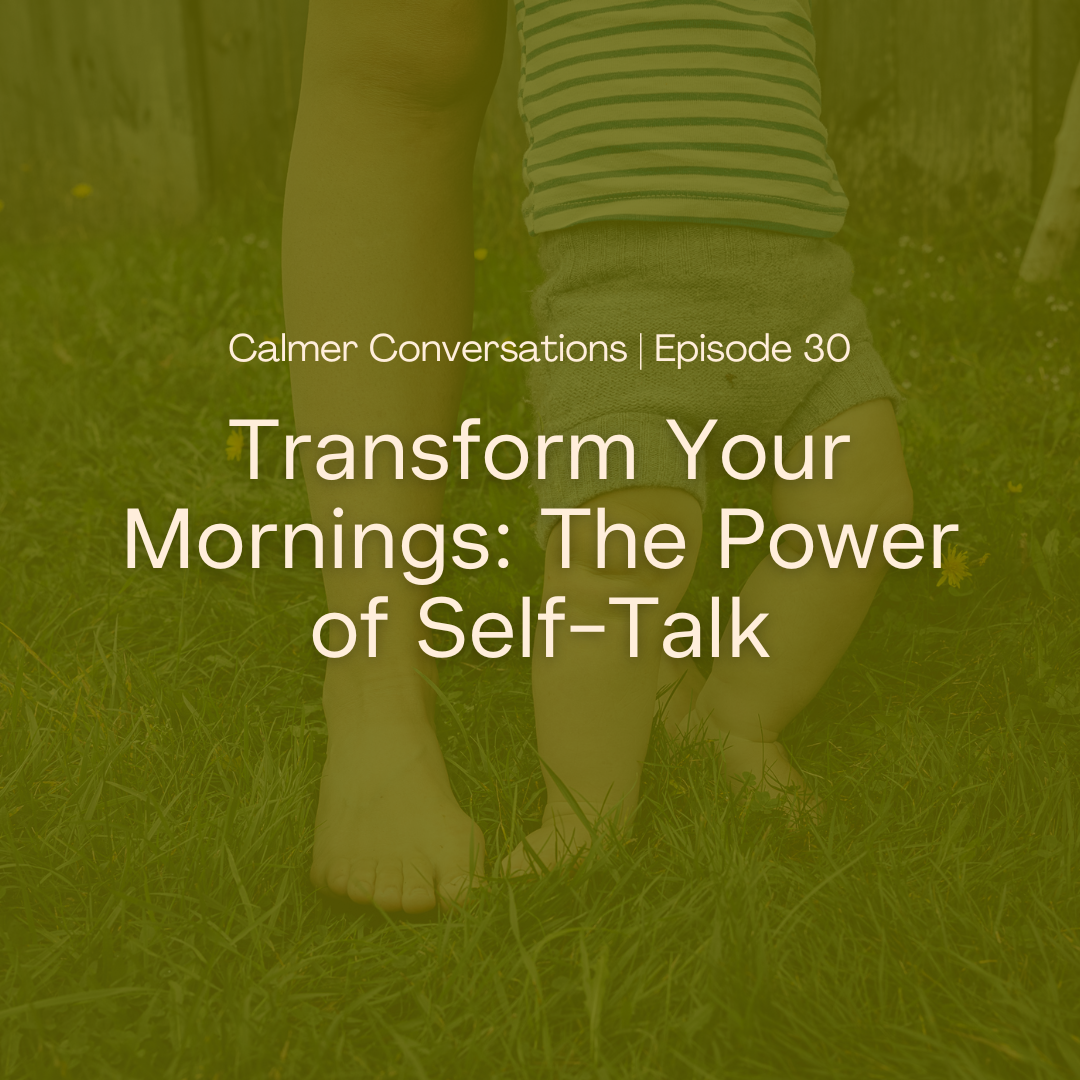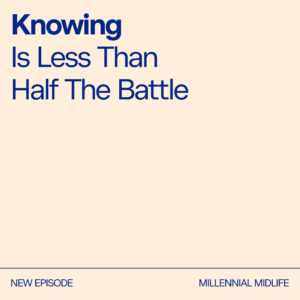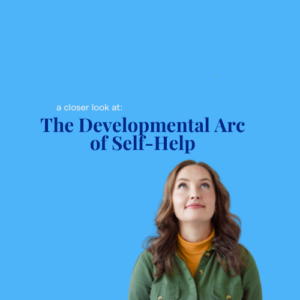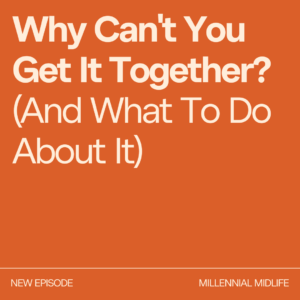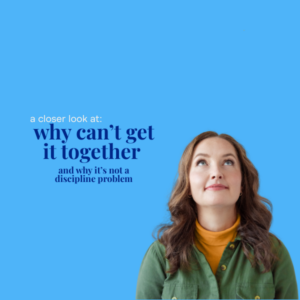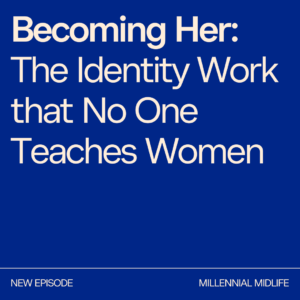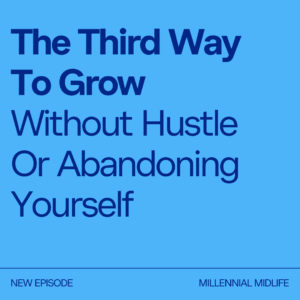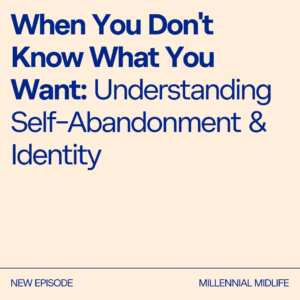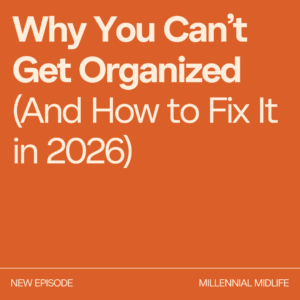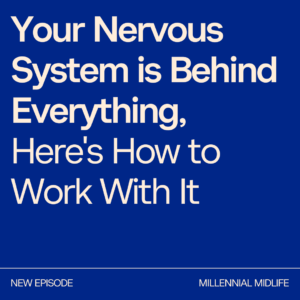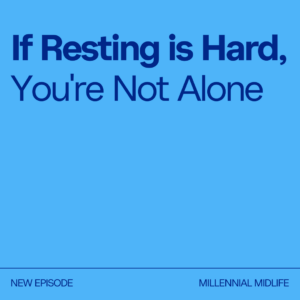Cecelia Baum Mandryk (00:01.048)
Hey and welcome to Calmer Conversations, episode number 29. I’m Cecilia, your host. Today we’re gonna talk about the things you tell yourself that really matter and I’m specifically gonna talk about waking up early in the morning. If you’re watching this live, not even live, I don’t do this live, but if you’re watching it, I wanna let you know that I’m kind of bouncing up and down and I’m doing that because I’ve tried to record this episode three times and I have a baby on me and I’m trying to get her back to sleep. So that’s just real life.
If you’re listening to this, hopefully the audio isn’t really impacted, but I just want to let you know that that’s what’s happening. yeah, so I’m bouncing up and down on my ball. And this is going to be another sort of short and sweet episode. This was something I taught a class last week to a group that I normally am not around. And this came up for somebody in terms of the change that they were trying to make. So this was a changing habits course.
using mindfulness and mindset to change habits rather than willpower or habit trackers or habit stacking or any of that kind of stuff, which is kind of my, it’s one of my sweet spots and I’m teaching a class on it probably next week actually, if you’re listening when this is gonna be edited. So I’ll make sure that there’s a link included that you can join it. It’ll be free probably about an hour or two hours and.
I can tell you exactly when it’s gonna be actually. So we’ll do it on Monday the 27th. And if you can’t make it live, we’ll probably do it at 11 a.m. Eastern time. If you can’t make it live, no problem. If you sign up, you’ll get the link. Okay, so we have the baby. And if you like the sounds, I’m glad you like the sounds. And if not, hopefully she’ll move back into sleep mode in just a second. Okay, so like I said, we’re gonna talk about
the thing you say to yourself when you first wake up in the morning. And I just want you to pause, like if you can, you know, don’t close your eyes if you’re driving or walking, but just take a moment and ask yourself, what’s the first thing I say to myself in the morning? And this is particularly if you have trouble waking up in the morning or you find yourself snoozing or you’re, you know, not going to work out when you want to work out, something like that. Okay. For most people, it’s I’m tired, right? That’s the first thing we say to ourselves when we wake up.
Cecelia Baum Mandryk (02:17.9)
And I want you right now, even if you say, you don’t say that, and even if you do say that, we’re gonna try to try another quick exercise. I want you to take a breath, a deep breath, maybe make a sire sound for the exhale. If you can, close your eyes or soften your gaze, maybe give yourself like a little bodily wiggle, do something like that, and see if you can, see if you can clear your brain. And then I want you to tell yourself, I’m tired, I’m so tired right now.
I wish I’d gotten more sleep. Notice how when you tell yourself that, or just notice how you feel first. How do you feel in your body? And most of us, me included, when I tell myself I’m tired, I feel tired. Like I can actually feel tiredness in my eyes. I can feel my body slumping over. I can kind of look over at my bed and think that I was in, I wish that I was in it right now.
Telling yourself you’re tired, whether it is true or not, actually brings up the feeling of tiredness for most of us. Sort of like if you tell yourself, don’t have enough time, whether that’s true or not, actually makes people feel anxious, frantic, despondent, unmotivated, like they’re running around like a chicken with their head cut off, whatever it is, right? So what you say to yourself matters. I feel like we’ve established that and we established that over and over again.
in these episodes, but the I’m tired one is so important. So this person in the course, one of the things they really wanted to be doing was waking up to exercise. But they found that most mornings they were hitting snooze. And it wasn’t because they disliked the exercise, they actually loved going to the gym, they loved how they felt afterwards, they really liked the routine that they had kind of established for themselves once they got to the gym. But their problem was they felt tired all the time. Every single morning they felt tired. And when I asked a question, they really said that they didn’t
It didn’t really matter how much sleep they got, right? If they got eight hours of sleep or if they got three hours of sleep, they kind of still felt tired in the morning. So I asked them, what do they say to themselves? And they said, I’m tired. That’s the first thing they say to themselves when they wake up. And so, and this is an example of how to use this work, right? And obviously I was working a little bit with this person in this course, but one of the first things you want to do is observe that, right? So this person is noticing, I keep snoozing my alarm.
Cecelia Baum Mandryk (04:42.38)
That’s the action they’re taking, right? I’m snoozing, I’m sleeping in. So then from that point, we want to get curious and say, okay, well, what am I feeling or what am I saying to myself that I think is causing the snoozing? For them, it was this statement, I’m tired. And it was this feeling of tiredness, right? So if you feel tired and you’re telling yourself you’re tired and you’re in a cozy bed already, it is very easy to hit snooze and go right back to sleep. This is also what your primitive brain wants you to do.
because your primitive brain wants to conserve energy and keep you safe. And I know you know the gym isn’t dangerous, but it is kind of hard and it’s going to require you to do something. So there’s a part of your brain that’s kind of on board with the untired story. Not to mention if you’ve been telling yourself I’m tired in the morning for years, and let’s admit this is kind of a societal story, right? I need my coffee to get going. I don’t get enough sleep. I’m so tired. And I’m a parent, right? And every time…
I’m around people with my children. They say like, you must be so tired, right? It’s this thing that we talk about all the time. And I’ll talk about my own tiredness in a minute if you’d like, if you want to listen to that. But it’s a societal story we have being tired. And I want to start to challenge that. I want you to start to challenge that. Not by gaslighting yourself, not by using toxic positivity, but you become aware of the story. You’ve noticed how it makes you feel. And then we’re going to ask, is there anything else I could believe?
So for this person, there anything else you can believe in the morning? One of the things they could believe was that I feel great after I work out. They really love, like I said, they love going to the gym. They actually really enjoyed the workouts. So they could tell themselves that, but that didn’t really, they didn’t think that that would really work in the moment. And I haven’t followed up with them, so I don’t know how this is going, by the way. But that didn’t really feel so great. So we asked, okay, what’s another thing that’s true in the morning that you could pretty easily switch to? And the thing we came up with,
And you might even pause this and see like if you can come up with something for yourself. But the thing that we came up for them was I’m alive. Right? It’s so simple and it’s so true. And in fact, most people might argue on a lot of mornings, it’s maybe more true than I’m tired because so often we proclaim that I’m tired rather than asking how does my body feel this morning?
Cecelia Baum Mandryk (07:01.518)
We don’t even do a check-in. We just kind of like stamp, I’m tired on ourselves as soon as we open our eyes or even before we open our eyes, as soon as we hear the alarm. And this person, after we, again, and this didn’t take a lot of time, right? But the thing that they, that sounded kind of great to them was I’m alive. It felt lighter. It felt more like there was more possibility in it. They really didn’t think that they would snooze when they’re saying I’m alive. Because if you say I’m alive, all of a sudden then you can ask, how do I feel this morning?
Right? And I’m a big fan of having some parameters around, you know, getting up and you could call them rules, but for instance, like if I have a fever, I’m not going to go to the gym, right? But by simply saying I’m alive and then checking in, they can actually notice, am I sick? Am I tired? How does my body feel? Are my kids healthy enough for me to leave the house? Whatever it is, right? But changing this one, just this one really, really small shift. I most of us would argue.
that seems inconsequential, right? Instead of telling yourself I’m tired, telling yourself I’m alive first thing in the morning. But the result is for a lot of people, and I know this because I’ve worked with other people on this, is that instead of snoozing their alarm, instead of having to use willpower to get themselves out of bed, all of sudden they get up, right? Because they feel different. And this is kind of the proof in the pudding of what you tell yourself creates how you feel and creates the actions that you take. With something like I’m tired, it’s so easy to see.
I tell myself I’m tired. I feel tired. I feel lethargic. When I feel lethargic and tired, I pull the covers up and I hit snooze. When I tell myself I’m alive, I feel kind of open. I like recognize like, wow, I’m alive this morning. That feels kind of good. Even if you’re not going to that, maybe it doesn’t feel like great to you, but you’re noticing something positive, right? And then from that space, then you’re feeling differently and oftentimes your actions are different. So.
Like I said, this is going to be a little bit of a short and sweet one. If you tell yourself you’re tired in the morning, I want you to try something else on for size. Maybe it’s I’m alive. Maybe it’s I can’t wait to get started today. Maybe it’s I’m really looking forward to seeing if Samantha’s at the gym. Maybe it’s whatever it is right for you. So see if you can make a really tiny change and make it make it so small that your brain thinks like that’s kind of silly. Right. The I’m alive switch for most people sounds feels like it’s kind of silly.
Cecelia Baum Mandryk (09:29.23)
and then figure out how you’re gonna remind yourself of it in the moment. And it doesn’t need to be when you get up. You can do this with other times during your day when you have some kind of habitual routine that you’re in, like with your combination between what you’re thinking and what you’re doing. But if you are someone who tells yourself you’re tired in the morning, really just check in with us. And then because I am a new parent and a parent of several small children now, am I tired? And I’m gonna go ahead and report that oftentimes I’m not.
Right? I don’t get great sleep. don’t, I, my kids are pretty good sleepers, but I will say that I don’t get great sleep. And still, I’m not, I don’t feel that tired most of the time, but I will tell you that several years ago, I stopped telling myself I was tired. I just didn’t do it. Even if I had a couple hours sleep, I refused to engage in that. I’m telling myself I’m tired. Again, not gaslighting myself for going into toxic positivity and not really ignoring things. So it’s not that I never say that I’m tired.
but that I would say like my legs feel heavy, right? Or I might take it easy today. Things like that, like different perspectives that had different feelings in my body. So play around with this. Again, this is an example of how making a really tiny switch in what you say and how you talk to yourself has a big impact on the rest of your day. And even if you don’t make it to the gym, you’re probably gonna feel different if you start with I’m alive. I’ve heard that Jill Bolte Taylor, who is, I can’t remember the name of her.
TED talk right now, but it’s a very popular TED talk on having a stroke because she had a stroke and she’s a neuroscientist of some kind. And I think she, first thing in the morning, says like thank you to her body because by the times you’ve woken up, your body has already done thousands of things correctly to help you be alive and help you do what you’re doing. So just a different perspective in the morning.
You don’t have to change the amount of sleep you’re getting. Change how you talk to yourself and see what happens. And check the link for the habit course that’s going to be happening on Monday the 27th. And I will see you then. Bye.

